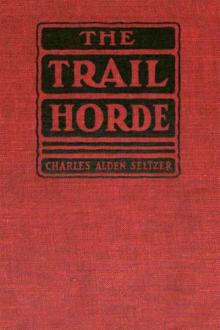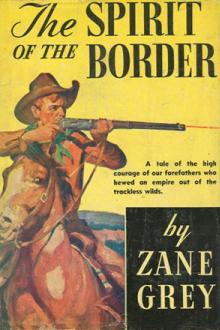The Border Legion, Zane Grey [books for 7th graders txt] 📗

- Author: Zane Grey
Book online «The Border Legion, Zane Grey [books for 7th graders txt] 📗». Author Zane Grey
Kells stalked away into the gloom.
Joan was left alone. She did not know whether to interpret his abstraction, his temper, and his action as favorable or not. Still she hoped and prayed they meant that he had some good in him. If she could only hide her terror, her abhorrence, her knowledge of him and his motive! She built up a bright camp-fire. There was an abundance of wood. She dreaded the darkness and the night. Besides, the air was growing chilly. So, arranging her saddle and blankets near the fire, she composed herself in a comfortable seat to await Kells's return and developments. It struck her forcibly that she had lost some of her fear of Kells and she did not know why. She ought to fear him more every hour—every minute. Presently she heard his step brushing the grass and then he emerged out of the gloom. He had a load of fire-wood on his shoulder.
“Did you get over your grief?” he asked, glancing down upon her.
“Yes,” she replied.
Kells stooped for a red ember, with which he lighted his pipe, and then he seated himself a little back from the fire. The blaze threw a bright glare over him, and in it he looked neither formidable nor vicious nor ruthless. He asked her where she was born, and upon receiving an answer he followed that up with another question. And he kept this up until Joan divined that he was not so much interested in what he apparently wished to learn as he was in her presence, her voice, her personality. She sensed in him loneliness, hunger for the sound of a voice. She had heard her uncle speak of the loneliness of lonely camp-fires and how all men working or hiding or lost in the wilderness would see sweet faces in the embers and be haunted by soft voices. After all, Kells was human. And she talked as never before in her life, brightly, willingly, eloquently, telling the facts of her eventful youth and girlhood—the sorrow and the joy and some of the dreams—up to the time she had come to Camp Hoadley.
“Did you leave any sweethearts over there at Hoadley?” he asked, after a silence.
“Yes.”
“How many?”
“A whole campful,” she replied, with a laugh, “but admirers is a better name for them.”
“Then there's no one fellow?”
“Hardly—yet.”
“How would you like being kept here in this lonesome place for—well, say for ever?”
“I wouldn't like that,” replied Joan. “I'd like this—camping out like this now—if my folks only knew I am alive and well and safe. I love lonely, dreamy places. I've dreamed of being in just such a one as this. It seems so far away here—so shut in by the walls and the blackness. So silent and sweet! I love the stars. They speak to me. And the wind in the spruces. Hear it.... Very low, mournful! That whispers to me—to-morrow I'd like it here if I had no worry. I've never grown up yet. I explore and climb trees and hunt for little birds and rabbits—young things just born, all fuzzy and sweet, frightened, piping or squealing for their mothers. But I won't touch one for worlds. I simply can't hurt anything. I can't spur my horse or beat him. Oh, I HATE pain!”
“You're a strange girl to live out here on this border,” he said.
“I'm no different from other girls. You don't know girls.”
“I knew one pretty well. She put a rope round my neck,” he replied, grimly.
“A rope!”
“Yes, I mean a halter, a hangman's noose. But I balked her!”
“Oh!... A good girl?”
“Bad! Bad to the core of her black heart—bad as I am!” he exclaimed, with fierce, low passion.
Joan trembled. The man, in an instant, seemed transformed, somber as death. She could not look at him, but she must keep on talking.
“Bad? You don't seem bad to me—only violent, perhaps, or wild.... Tell me about yourself.”
She had stirred him. His neglected pipe fell from his hand. In the gloom of the camp-fire he must have seen faces or ghosts of his past.
“Why not?” he queried, strangely. “Why not do what's been impossible for years—open my lips? It'll not matter—to a girl who can never tell!... Have I forgotten? God!—I have not! Listen, so that you'll KNOW I'm bad. My name's not Kells. I was born in the East, and went to school there till I ran away. I was young, ambitious, wild. I stole. I ran away—came West in 'fifty-one to the gold-fields in California. There I became a prospector, miner, gambler, robber—and road-agent. I had evil in me, as all men have, and those wild years brought it out. I had no chance. Evil and gold and blood—they are one and the same thing. I committed every crime till no place, bad as it might be, was safe for me. Driven and hunted and shot and starved—almost hanged!... And now I'm—Kells! of that outcast crew you named 'the Border Legion!' Every black crime but one—the blackest—and that haunting me, itching my hands to-night.”
“Oh, you speak so—so dreadfully!” cried Joan. “What can I say? I'm sorry for you. I don't believe it all. What—what black crime haunts you? Oh! what could be possible tonight—here in this lonely cañon—with only me?”
Dark and terrible the man arose.
“Girl,” he said, hoarsely. “To-night—to-night—I'll.... What have you done to me? One more day—and I'll be mad to do right by you—instead of WRONG.... Do you understand that?”
Joan leaned forward in the camp-fire light with outstretched hands and quivering lips, as overcome by his halting confession of one last remnant of honor as she was by the dark hint of his passion.
“No—no—I don't understand—nor believe!” she cried. “But you frighten me—so! I am all—all alone with you here. You said I'd be safe. Don't—don't—”
Her voice broke then and she sank back exhausted in her seat. Probably Kells had heard only the first words of her appeal, for he took to striding back and forth in the circle of the camp-fire light. The scabbard with the big gun swung against his leg. It grew to be a dark and monstrous thing in Joan's sight. A marvelous intuition born of that hour warned her of Kells's subjection to the beast in him, even while, with all the manhood left to him, he still battled against it. Her girlish sweetness and innocence had availed nothing, except mock him with the ghost of dead memories. He could not be won or foiled. She must get her hands on that gun—kill him—or—! The alternative was death for herself. And she leaned there, slowly gathering all the unconquerable and unquenchable forces of a woman's nature, waiting, to make one desperate, supreme, and final effort.
5
Kells





Comments (0)